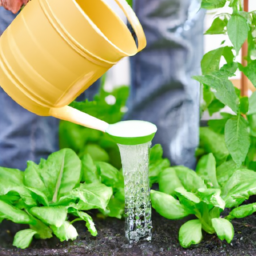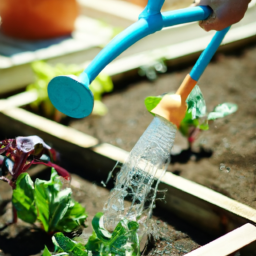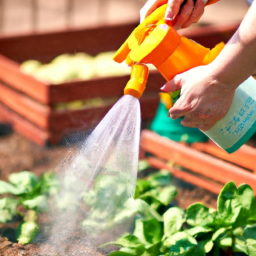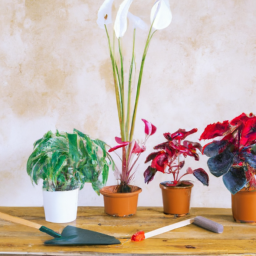
Are you wondering about the best time to water a vegetable garden? It’s a common question among gardeners looking to keep their plants healthy and thriving. Knowing the optimal time to water your garden can make a big difference in the success of your crops. Let’s explore the importance of timing when it comes to watering your vegetable garden and how you can ensure your plants get the hydration they need to flourish.
Importance of Timing: Best Time to Water a Vegetable Garden
When it comes to maintaining a healthy and thriving vegetable garden, one of the most crucial factors to consider is the timing of watering. Watering your vegetable garden at the right time can make a significant difference in the growth and yield of your plants. In this article, we will discuss the best time to water a vegetable garden and why timing is so important.
Why Timing Matters
Timing is everything when it comes to watering your vegetable garden. Watering at the wrong time can lead to a range of issues, including overwatering, underwatering, and increased susceptibility to diseases. By watering your garden at the optimal time, you can ensure that your plants are getting the right amount of water when they need it most.
One of the main reasons why timing is so important is that plants have different water requirements at different times of the day. For example, watering your garden in the middle of a hot afternoon can result in water evaporation before it can be absorbed by the plants’ roots. On the other hand, watering in the early morning or late evening allows the water to penetrate the soil and reach the roots more effectively.
Another reason why timing matters is that watering at the wrong time can promote the growth of weeds. When you water your garden during the day, you are not only watering your plants but also providing moisture for weeds to thrive. By watering in the early morning or late evening, you can minimize weed growth and give your plants a better chance to flourish.
In addition to plant health, timing also plays a role in water conservation. By watering your garden at the optimal time, you can reduce water wastage and ensure that your plants are receiving the right amount of moisture without overwatering. This not only helps to conserve water but also saves you time and effort in the long run.
Best Times to Water Your Vegetable Garden
The best time to water your vegetable garden is in the early morning or late evening. Watering in the early morning allows the plants to absorb moisture before the heat of the day sets in, while watering in the late evening gives the plants a chance to hydrate before the cooler night temperatures.
In the early morning, the soil is still cool from the night, which helps to reduce water evaporation and allows the water to penetrate the soil more effectively. This ensures that the plants’ roots receive the moisture they need to thrive throughout the day. Additionally, watering in the early morning helps to prevent the growth of mildew and other fungal diseases that thrive in damp conditions.
Watering in the late evening can also be beneficial, especially during hot summer months. By watering your garden in the late evening, you can help your plants recover from the heat of the day and prepare for the cooler night temperatures. This allows the plants to absorb moisture more efficiently and reduces the risk of water evaporation.
It is important to avoid watering your vegetable garden during the middle of the day, as the heat can cause water to evaporate before it can be absorbed by the plants’ roots. Additionally, watering at this time can increase the risk of sunburn on the leaves and promote the growth of weeds. By sticking to the early morning or late evening watering schedule, you can ensure that your vegetable garden remains healthy and thriving throughout the growing season.
In conclusion, the timing of watering your vegetable garden plays a crucial role in the health and growth of your plants. By watering in the early morning or late evening, you can ensure that your plants receive the right amount of moisture at the optimal time. This not only helps to promote plant health but also conserves water and reduces the risk of diseases. So, next time you head out to water your vegetable garden, remember to consider the timing and give your plants the best chance to flourish.

Factors to Consider for Watering: Best Time to Water a Vegetable Garden
Climate and Weather Conditions
When it comes to watering your vegetable garden, one of the most important factors to consider is the climate and weather conditions in your area. Different regions have different levels of rainfall and humidity, which can affect how often and when you need to water your plants.
In hot, dry climates, you may need to water your garden more frequently, especially during the peak of summer when temperatures are at their highest. In contrast, if you live in a cooler, more humid climate, you may not need to water your garden as often, as the soil will retain moisture for longer periods of time.
It’s also important to pay attention to the weather forecast when deciding when to water your vegetable garden. If rain is in the forecast, you may be able to skip a watering session, as nature will take care of watering your plants for you. On the other hand, if a heatwave is on the horizon, you may need to water your garden more frequently to prevent your plants from wilting.
In general, it’s best to water your vegetable garden in the early morning or late evening, when temperatures are cooler and the sun is not as strong. This will help prevent water from evaporating too quickly and ensure that your plants have enough moisture to thrive.
Type of Vegetables and Soil Composition
Another factor to consider when determining the best time to water your vegetable garden is the type of vegetables you are growing and the composition of your soil. Different vegetables have different water requirements, so it’s important to tailor your watering schedule to meet the needs of each type of plant.
For example, leafy greens like lettuce and spinach require more frequent watering, as they have shallow roots and are more susceptible to drying out. On the other hand, root vegetables like carrots and beets can tolerate drier conditions and may only need to be watered once a week.
In addition to considering the type of vegetables you are growing, it’s also important to take into account the composition of your soil. Sandy soils drain quickly and may require more frequent watering, while clay soils retain moisture for longer periods of time and may not need to be watered as often.
To determine the moisture level of your soil, you can perform a simple test by sticking your finger into the soil up to the first knuckle. If the soil feels dry, it’s time to water your garden. If it feels moist, you can hold off on watering for a day or two.
Watering Techniques and Tools
When it comes to watering your vegetable garden, the technique and tools you use can also impact the best time to water your plants. There are several different methods for watering your garden, including using a hose, watering can, or drip irrigation system.
If you are using a hose or watering can, it’s best to water your garden in the early morning or late evening to minimize evaporation and ensure that the water reaches the roots of your plants. It’s important to water your garden deeply and infrequently, rather than giving your plants a light sprinkle every day.
Drip irrigation systems are another popular option for watering vegetable gardens, as they deliver water directly to the roots of your plants, minimizing waste and promoting healthy growth. Drip irrigation systems can be programmed to water your garden at specific times of the day, making it easy to ensure that your plants receive the right amount of moisture.
In conclusion, the best time to water your vegetable garden will depend on a variety of factors, including climate and weather conditions, the type of vegetables you are growing, and the composition of your soil. By taking these factors into consideration and using the right watering techniques and tools, you can ensure that your plants receive the moisture they need to thrive and produce a bountiful harvest.

Tips for Optimal Watering Schedule: Best Time to Water a Vegetable Garden
Understanding the Watering Needs of Your Vegetable Garden
When it comes to watering your vegetable garden, it’s important to understand the specific needs of each plant. Different vegetables have different requirements when it comes to water, so it’s essential to tailor your watering schedule to meet those needs.
One of the key factors to consider is the type of soil in your garden. Sandy soil drains quickly and may require more frequent watering, while clay soil retains water longer and may need less frequent watering. Understanding the soil composition will help you determine how often and how much to water your vegetables.
Another factor to consider is the stage of growth of your plants. Newly planted seeds and seedlings require more frequent watering to help them establish roots, while mature plants may need less water once they are established. Be sure to monitor the moisture levels in the soil and adjust your watering schedule accordingly.
It’s also important to consider the weather conditions in your area. Hot, dry weather will increase the water needs of your plants, while cool, rainy weather may require less frequent watering. Keep an eye on the weather forecast and adjust your watering schedule as needed to ensure your plants are getting the right amount of water.
Best Time of Day to Water Your Vegetable Garden
The best time of day to water your vegetable garden is in the early morning. Watering in the morning allows the plants to absorb the moisture before the heat of the day evaporates it. This helps to reduce the risk of fungal diseases and ensures that your plants have enough water to get them through the day.
Avoid watering in the middle of the day when the sun is at its strongest, as this can lead to water loss through evaporation and can also cause damage to the leaves of your plants. Watering in the evening is also not recommended, as the moisture on the leaves overnight can increase the risk of fungal diseases.
If you are unable to water in the morning, late afternoon is the next best time to water your vegetable garden. This allows the plants to take up the water before nightfall, reducing the risk of disease. Be sure to water at the base of the plants to avoid wetting the leaves, which can lead to fungal issues.
How to Water Your Vegetable Garden for Optimal Results
When watering your vegetable garden, it’s important to water deeply and infrequently. This encourages the plants to develop deep root systems, which makes them more resilient to drought conditions. Shallow, frequent watering can lead to shallow root systems, which make the plants more susceptible to stress.
Use a soaker hose or drip irrigation system to deliver water directly to the roots of your plants, rather than spraying the foliage. This helps to reduce water waste and prevents the spread of diseases. Mulching around your plants can also help to retain moisture in the soil and reduce the need for frequent watering.
Monitor the moisture levels in the soil regularly by sticking your finger into the soil to a depth of a few inches. If the soil feels dry, it’s time to water. Be sure to water thoroughly, ensuring that the water penetrates deeply into the soil. Avoid overwatering, as this can lead to root rot and other issues.
By following these tips for optimal watering schedule, you can ensure that your vegetable garden thrives and produces a bountiful harvest. Paying attention to the specific needs of your plants, watering at the right time of day, and using proper watering techniques will help you maintain a healthy and productive garden.
Here’s what we learned
When it comes to watering your vegetable garden, timing is everything. The best time to water your plants is in the morning, ideally before 10 a.m. This allows the water to penetrate the soil and reach the roots before the heat of the day causes evaporation. Watering in the morning also helps prevent the growth of fungus and other diseases that thrive in damp conditions.
Avoid watering your vegetable garden in the evening, as the moisture can linger on the leaves overnight and lead to mold and mildew. It’s also not ideal to water during the hottest part of the day, as the water can evaporate before it has a chance to benefit your plants. By watering in the morning, you’ll give your vegetables the hydration they need to thrive and produce a bountiful harvest. Remember, consistency is key when it comes to watering your garden, so make it a habit to water in the morning to keep your plants happy and healthy.
Here are the top questions that we were asked:
Q1. When is the best time to water a vegetable garden?
A1. The best time to water a vegetable garden is in the early morning, preferably before 10 a.m. This allows the plants to absorb the moisture they need before the heat of the day sets in.
Q2. Is it okay to water a vegetable garden in the evening?
A2. While it is not ideal to water a vegetable garden in the evening, it can be done if necessary. Just be mindful of watering the soil and not the leaves to prevent fungal diseases.
Q3. How often should I water my vegetable garden?
A3. The frequency of watering your vegetable garden will depend on factors such as the type of vegetables you are growing, the weather conditions, and the soil type. In general, most vegetable gardens require about 1 inch of water per week.
Q4. Should I water my vegetable garden on a schedule?
A4. It is recommended to water your vegetable garden on a consistent schedule to ensure that the plants receive the necessary moisture. However, be sure to adjust the frequency based on the weather conditions.
Q5. What are some signs that my vegetable garden needs more water?
A5. Some signs that your vegetable garden needs more water include wilting leaves, yellowing or browning of leaves, and dry, crumbly soil. It’s important to monitor your plants regularly to ensure they are getting the right amount of water.

James Wong is a renowned ethnobotanist, plant scientist, and local television presenter. With a passion for demystifying plant science, he is known for translating complex botanical concepts into practical advice for everyday plant enthusiasts. James’s expertise spans from traditional gardening to cutting-edge plant technologies, making his insights accessible and informative.


